[ I’m delighted to be able to share with you today a story from Jim Griffioen, a simply wonderful writer living in Detroit and author of Sweet Juniper, which is not exactly an urbanist blog, but like everything in Detroit is simply unlike anything else out there – and in a good way. I know you’ll enjoy it – Aaron. ]
I’m just one of about 800,000 people still living in the city of Detroit, Michigan, the nation’s 11th most-populated city. Because of the events of the last half century, this is a city that journalists and academics love to examine and study. In focusing on the sensational, they often concoct maddening generalizations about what they’ve found here. In the time I’ve lived in Detroit, I’ve come to realize that the most sensational claims and the public perception they create often have little to do with the day-to-day reality of being a Detroiter. This is a complicated city, and even in the most sincere efforts to cull some truth from it, visiting journalists often end up spreading damaging falsehoods.
One of the most annoying is that Detroit has no grocery stores.
This is something that I have been hearing about for many years. While attending law school in nearby Ann Arbor, I was told that everyone who lives in Detroit has to go to the suburbs to do their grocery shopping. With the recent spate of journalists visiting Detroit, this “fact” has gained even more traction. NBC’s Chris Hansen recently took some time away from his grueling schedule of catching predators to draw attention to how difficult it is to find groceries in Detroit: “There are more than 400 liquor stores in Detroit. But if you want to buy food, good luck. In the entire 140 square miles of the city, there are no Krogers, no Safeways, only eight supermarkets, and they’re discount stores.” (Dateline NBC, April 20, 2010). Andrew Grossman of the Wall Street Journal emphasized that Detroit lacks “chain” grocers: “No national grocery chain operates a store here. A lack of outlets that sell fresh produce and meat has led the United Food and Commercial Workers union and a community group to think about building a grocery store of its own.” (WSJ, June 16, 2009) And most recently, Richard C. Longworth (senior fellow at the Chicago Council on Global Affairs and former Distinguished Visiting Scholar at DePaul University) writes in Good Magazine: “This seems incredible–a city of nearly 1 million people without a supermarket–but it’s true. No A&P. No Meijer’s. Not even a Wal-Mart. Any Detroiters who want fresh store-bought fruits and vegetables or wrapped meats have to get in their car and drive to the suburbs. That is, if they have a car.”
I’m tired of being nice about this. That is such utter and total bullshit.
I know the traditional media is suffering. Reporters are overworked and underpaid. Scholars like Mr. Longworth, too, might not have the research assistants they once enjoyed, but I would certainly expect anyone who makes an unequivocal statement like Detroit “is a city of nearly 1 million people without a supermarket” to at least have done a 4-second google search to confirm it (six seconds, I guess, if google isn’t your homepage). In four seconds, here’s what I found:

Each of those orange dots is a supermarket, not a liquor or discount store. A couple of them are even Aldi stores, a chain supermarket operated by the same company that owns Trader Joes. Many of those dots represent “Spartan Stores,” associated with a regional food distributor that “supplies 40,000 private label and national brand products to nearly 400 independent grocery stores.” A quick search on the Spartan website shows how many affiliates exist within Detroit city limits:
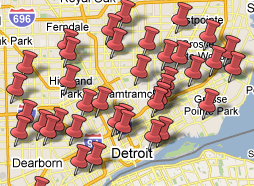
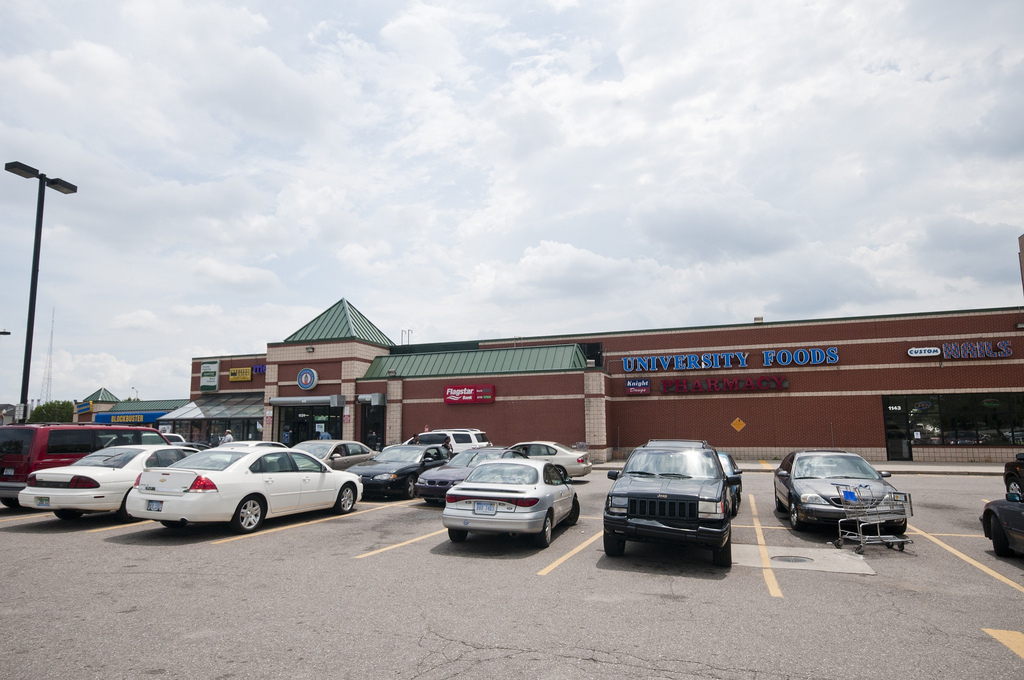
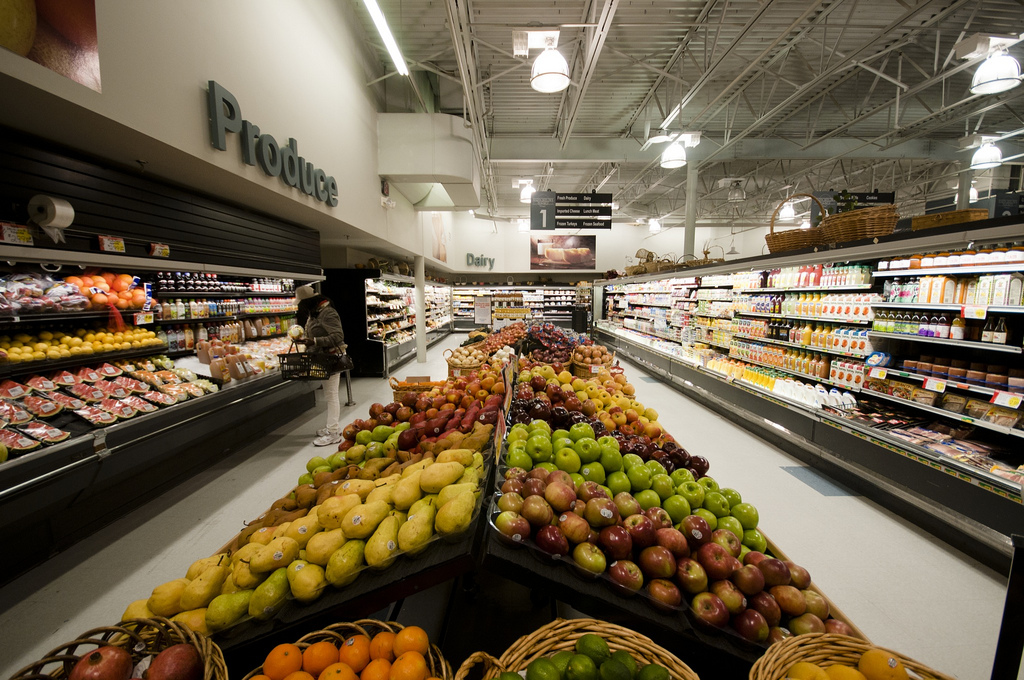
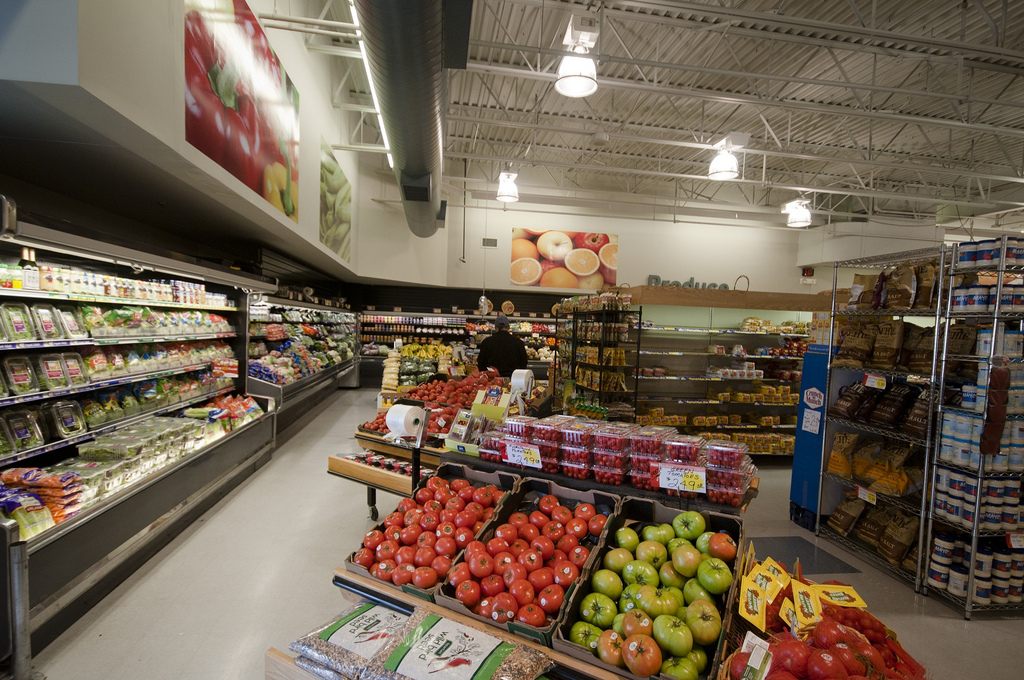
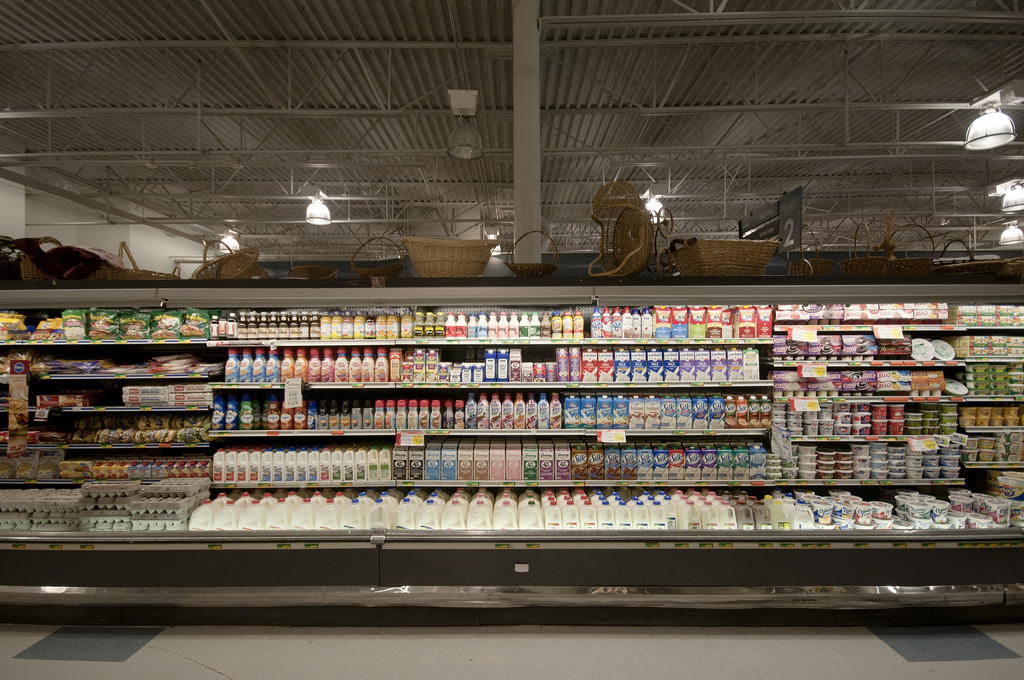
What surprises most people who’ve heard that there are no grocery stores in Detroit is that there are actually independent stores far more appealing than any chain. One of the nicest grocery stores in Detroit is Honeybee La Colmena (I wrote an extensive profile about the store here). Honeybee is owned and operated by individuals who grew up and still live in the neighborhood where the store is located and they have created dozens of jobs for their neighbors. Honeybee has some of the best produce and prepared foods in the metro area, and it is actually a Detroit supermarket where people from the suburbs come into the city to shop.
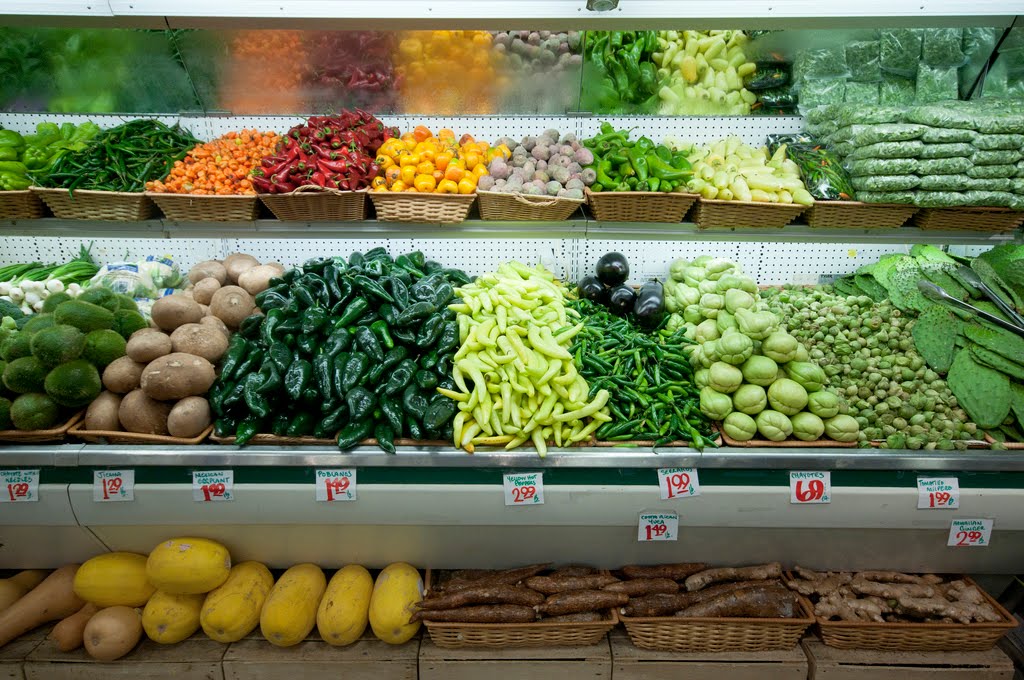
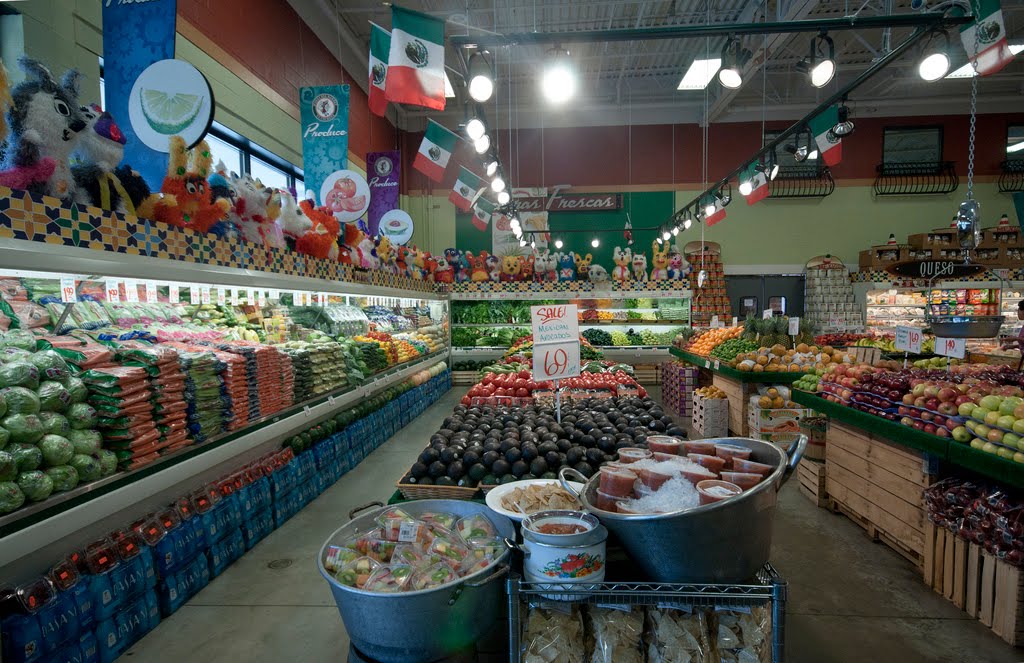
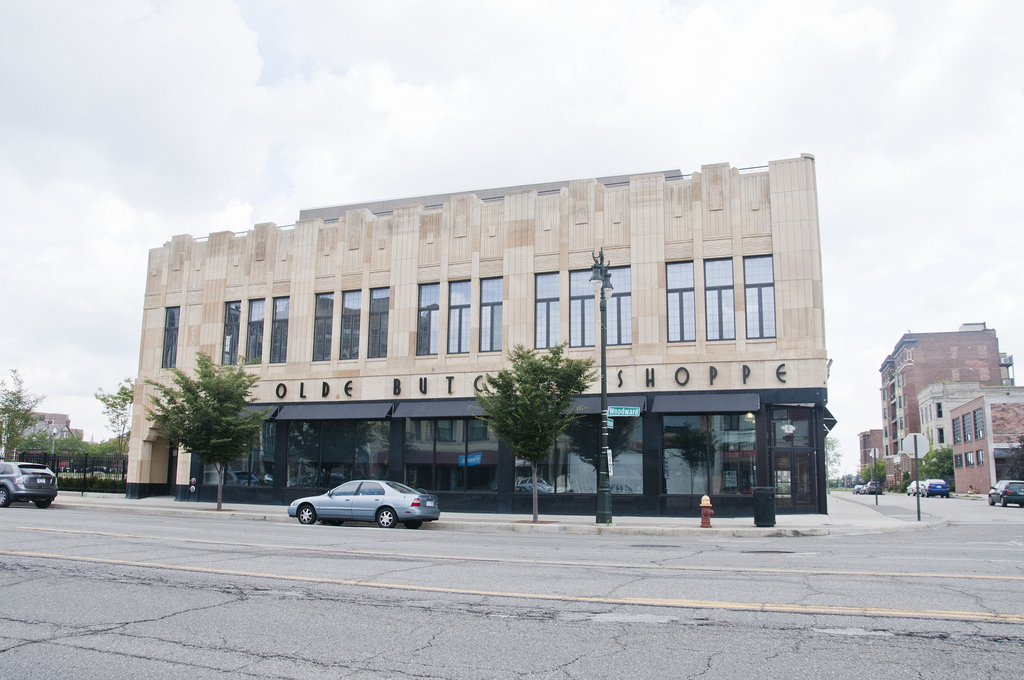
* * * * *
The myth of a city without supermarkets is hard to kill, even faced with the evidence above. Ultimately, that myth perseveres because the mainstream media and its audience is steeped in a suburban mentality where the only grocery stores that really seem to count are those large, big-box chain stores that are the only option in so many communities these days, largely because they have put locally-owned and independent stores like the ones you find in Detroit out of business. It is true that the big chain stores have forsaken or ignored Detroit, for any number of understandable (and sometimes despicable) reasons. But in their absence, a diverse system of food options has risen to take their place, and the tired old narrative that Detroit has nowhere to shop for groceries needs to be replaced by a more complex truth: with a diversity of options ranging from the dismal to the sublime, Detroit may be one of the most interesting places in America to shop for food.
Much has been written about urban farming in Detroit. No one really believes these tiny farms will ever sustain the produce needs of an entire city, but few doubt that they will continue to play an important role in the city’s transformation and they will only grow in importance as an integral part of the city’s food culture. The vegetables and fruits grown in Detroit’s gardens are so bountiful that neighborhood produce stands pop up; a coalition of inner-city gardeners sells thousands of pounds of affordable produce almost daily during the growing season at local farmer’s markets. Soup kitchens and schools supply their own produce from extensive and expertly farmed plots. In 2010, several Detroit farmers banded together to start the first CSA deliveries consisting entirely of produce grown in the city. Small-scale farming in Detroit has actually become a viable part of the urban food system and not just a novelty as it is in other cities.
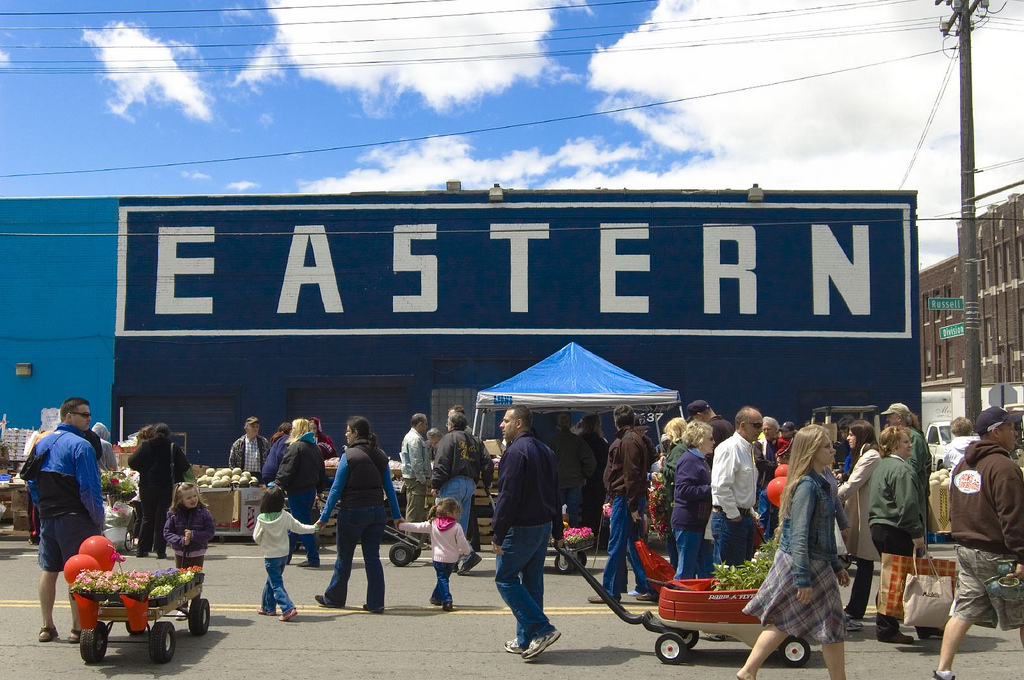
Most Detroiters are keenly aware of the Saturday public market in the newly renovated turn-of-the-century market sheds, where as many as 40,000 people come downtown to shop for fresh local produce every week, and many have been doing it for decades. “If all these reporters are right when they say Detroiters have to travel to the suburbs to buy fresh produce, why do 15,000 or more suburbanites drive down here every weekend to buy fresh produce?” asks Mr. Carmody. The Eastern Market Corporation has worked hard to make the produce sold by its vendors accessible to all Detroiters. Saturday vendors accept tokens created through a program in effect since 2007 where shoppers can use their Bridge card to buy fresh produce. It has created the innovative “Double Up Food Bucks” program that “provides families receiving food assistance benefits with the means to purchase more fresh fruits and vegetables at farmers’ markets.” And the “Michigan Mo’ Bucks” program aims to stretch the amount of money families receiving assistance get when that money is spent on fresh produce. Eastern Market is not just for the overpriced localvore yuppie/foodie crowd, but it succeeds in serving the needs of all Detroiters. And nowhere is this region’s diversity on better display than a Saturday morning at Eastern Market, when tens of thousands of people from all backgrounds converge to buy fresh and affordable local produce.
What many people don’t realize is that Eastern Market buzzes with activity Monday through Friday. The wholesale business of distributing fresh produce to groceries and supermarkets throughout the region gets underway well before most people wake up in the morning. Mr. Carmody tells me that some of fanciest independent grocery stores in the metro area (Papa Joe’s, Plum, Westborn, etc.) all send buyers down to Eastern Market before dawn to pick out the best local and regional produce for their stores. That means the expensive tomatoes and apples sitting on shelves in suburban Birmingham and St. Clair Shores likely came through the “food desert” of Detroit. These wholesale buyers come to Eastern Market for local products first, before they head to the Produce Terminal (also in Detroit) for produce trucked in from California or elsewhere. As “buying local” becomes more and more important to consumers, so will Eastern Market and its longstanding ties to local and regional farmers.
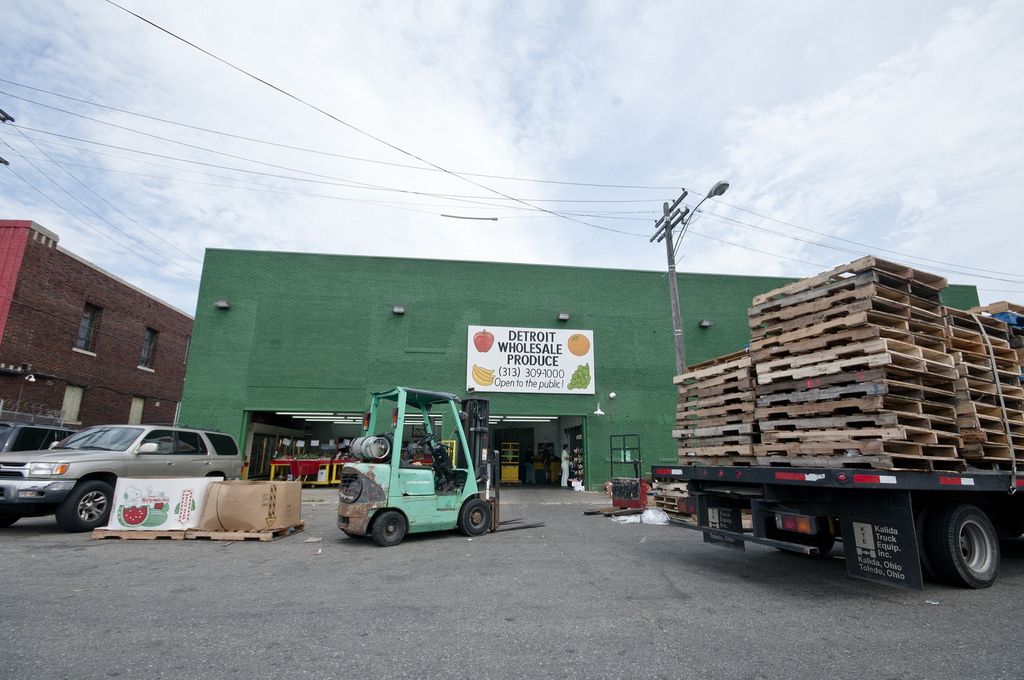
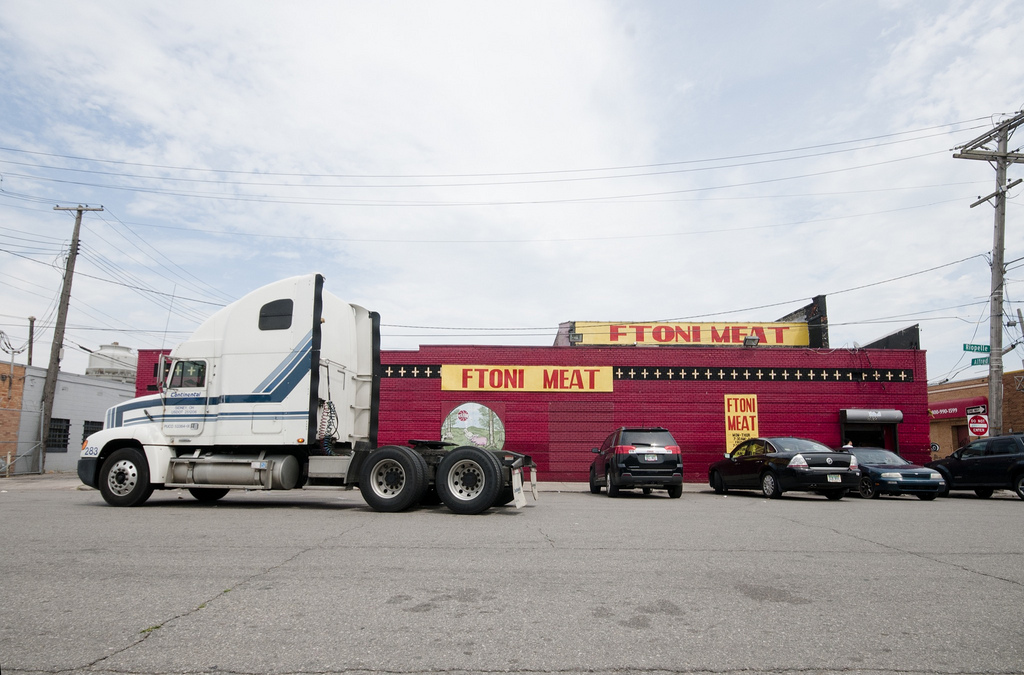
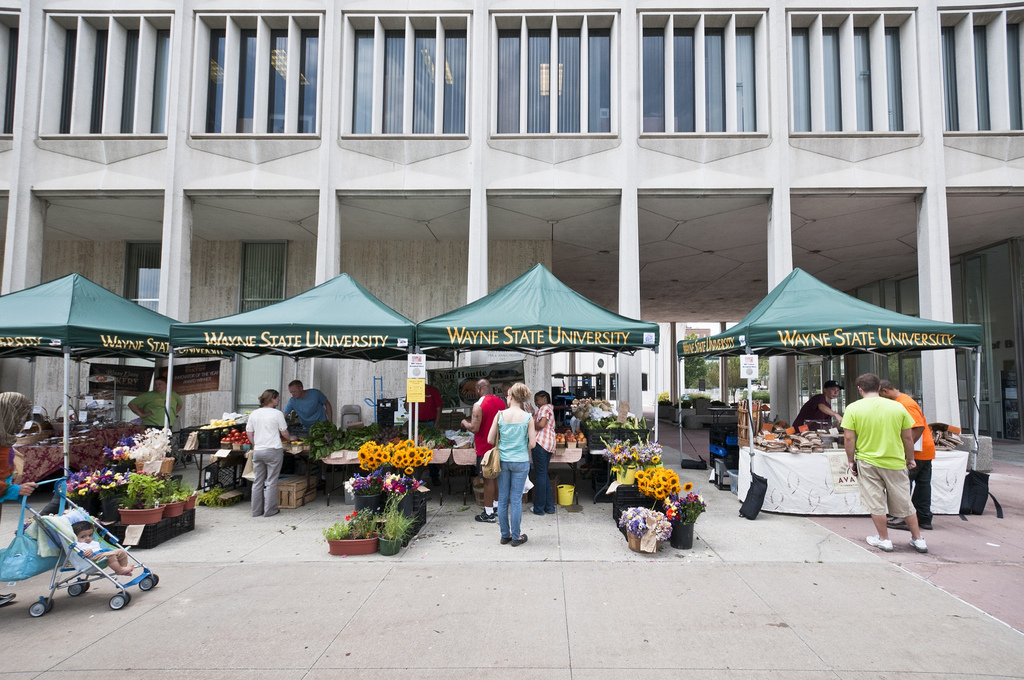
_______
James Griffioen writes a blog called Sweet Juniper. It’s not about Detroit specifically, just his ordinary life raising a family in that city. In 2006, he walked away from a career as a corporate lawyer and is now a freelance writer and photographer who spends most of his time raising his two young children. His photos and writings have appeared in Harper’s, Vice, Time, Dwell, O Magazine, Fortune, New York, Foam, The Baffler, Muse, Landscape Architecture and many other publications.
Excellent piece… thanks for sharing.
Really good article. I’ve never quite understood the implication of having or not having a “national chain” store. If you have food options, and you can buy food to sustain yourself, that’s really what matters, right?
Great article. I do think many urban areas, and probably many in Detroit, do still have food desert problems. But so do some Columbus neighborhoods, which is considered a much healthier city.
It’s really interesting that this may be the kind of area where Detroit begins to rebuild. When the chains move out, people have only themselves to rely on. What they build may ultimately define urban America in the next century.
While our National media often get their facts wrong about Detroit, we can hardly be surprised since our own Detroit media continues to reinforce the same sensational and incorrect claims. Take for example an article appearing in today’s Detroit Free Press by Brent Snavely (http://www.freep.com/article/20110121/BUSINESS06/110121038/0/cityguide01). According to Brent, Detroit’s issues include “high insurance rates, the lack of retail such as grocery stores and a dysfunctional school system.” As a city we absolutely must start talking about the actual reality of living in Detroit, not the public perception according to the media. By setting a good example others will start to listen and eventually the narrative will change.
Thank you James for your tirade as it echos many of Detroit’s residents’ own thoughts and conversations. As a Detroit resident I am also frequently asked “Where do you grocery shop?” from just about everyone I know who does not live in the city. My response often touches on many of the same points James makes in this post. I love grocery shopping in Detroit for the options and affordability it offers, and have no desire for big-box stores to replace my local grocers.
HOORAY!!!!!!! Great piece!!!!
Excellent piece. I live at Eight Mile and Woodward in the city and can choose between two decent stores, one of which is a very nice independent store that is clean and well stocked, and replaced a Farmer Jack I never shopped at because it was dirty and had an awful selection.
Hit the nail on the head. Everyone in the world who has ever editorialized about Detroit should visit Eastern Market just once for 15 minutes on a Saturday morning. Talk about a transformative experience. And I second Mr. Griffioen — La Colmena is a great little grocery store.
Excellent blog! I had heard this rumor and as someone who lives in Northern Michigan, it makes me want to get in the car and drive to Detroit for some of the nicest looking produce I’ve seen in awhile!
Growing up as a suburban metro-Detroiter, my dad was a truck driver for Eastern Market, and the gifts and leftovers he brought home from the vendors he drove for way outrivaled what was available at the Kroger up the street — and that was in the 80s! Detroit has so many overlooked resources. Thanks for sharing!
Well, now that the media has convinced most of the world that Detroit is a completely depopulated wasteland, the next amazing headlines can be written: “800,000 found to be secretly living in abandoned city”, subtitled “Experts agog – ‘where did they all come from?'”, “Theories of underground hipster migration from Billyburg abound”, “Unknown markets with exotic fresh produce spring from nowhere”. Or has The Onion already done this?
Seriously though, I had not heard of Eastern Market prior to reading the post – it looks great.
**Prefaced with having left the city about 3 years ago**
While I agree that it’s a gross exaggeration that there are NO grocery stores in the city, I did find the offerings limited and did have to leave the city for more than a few staples. While I think no suburban market can compete with Honeybee for produce or the meat counter, other household items had to be purchased elsewhere. I think this is where the concept of a SUPERmarket comes in. Honeybee is not a supermarket, in my mind. It’s an amazing market where I could buy almost all the food I needed.
University had frequently expired foods on the shelf, a terrible produce section, and, occasionally, angry gun-wielding customers. Granted, not THEIR fault that the angry customers packed heat, but still not making for a relaxing shopping experience. However, they had some damn fine ribs at the deli counter, and based on the photos above (if that 2nd one is University) they’ve cleaned up a bit.
Also, Aldi is a discount grocer, hence the limited and ever-changing brands and lack of bags.
Well said!
Say it!
re: the comment about 800,000 people living in Detroit, a fun quiz (at least to me) is to ask others what the second largest city in the midwest is, metro or city proper. For all its problems and decline, Detroit is still a big American city.
Bravo. Ass kicked.
Great article. I live in the city, near two independent stores, one older and smaller but good selection (including organic produce that’s cheaper than at stores in the suburbs); one a former Farmer Jack that looks better than it did when it was Farmer Jack. Both with helpful people.
Excellently done, Jim! I have been shopping in Detroit for all my grocery needs at the same independent market for 24 years now along with the wonderful original Joe Randazzo’s fruit and veggie market for just as long and my family hasn’t managed to starve yet. I like spending my money in the community where I live that my grocery bill usually ends up being about half what I have paid at one of the big ‘burban markets the rare times I have ventured to one. And yes, Eastern Market is an absolute jewel. Thank you for this wonderful piece on one of the subjects that always gets me a bit ranty when it comes up.
Partly off-topic, but some activists have made similar points about black America and about Appalachia. Although both are stereotyped as poor, they’re both majority middle-class, just with higher-than-average poverty rates, and a lot of ghettoization. It’s the same with Detroit – it really does have some major food deserts in it, but it still has plenty of supermarkets.
But because the majority elite likes sensational stories about how the other half lives, in which the other half barely gets a speaking role, it concentrates on the extremes: black people all live in the ghetto, Appalachians have no teeth and are addicted to meth, Detroit has no supermarkets.
THANKYOUTHANKYOUTHANKYOUTHANKYOUTHANKYOUTHANKYOUTHANKYOUTHANKYOUTHANKYOUTHANKYOUTHANKYOUTHANKYOUTHANKYOUTHANKYOUTHANKYOUTHANKYOU! THANK YOU! I am CONSTANTLY asked if Detroit has any supermarkets and when I answer “yes” I’m told I’m wrong. Detroit doesn’t need a Kroger’s or Red Plum Market. Detroit has better “groceries” than the suburbs do! I used to do my grocery shopping IN Detroit before heading back out to Novi when I was a student at Wayne State.
Thank you, Aaron, for posting this and thank you, Jim, for writing this!
I’ll take the Eastern Market over Kroger’s ANY DAY!
Great article. Unfortunately, all too often the media has its narrative and if the truth does not fit it, the truth is ignored.
I’m glad to hear the people of Detroit have terrific choices for food and are eating.
Most interesting. I live in the UK in a small country town (Population 6,000 plus maybe 8,000 more in the hinterland) where we are constantly told we are missing out because we do not have a large branch of one the big UK supermarkets. Yes, if we want that all-in shop, we have to drive to another town. Poor us.
But we do have a busy main street with about thirty independent family run businesses and what we Brits call shops – a butcher, a greengrocery, three bakers, a hot food shop and deli, a health food shop and two small branches of supermarkets, one of which is a Co-operative. In addition, the people who come here to use those food shops also support a post office, a pharmacy, a fabric and craft store, two flower stores, two jewellers, a toy shop, a real old-fashioned gent’s outfitters, an upmarket ladies clothes store, an antique store, two book shops, a pet store, a newsagent, a bicycle and dollshouse store (yes, the two in one!), two hardware stores, two opticians, three banks, a travel agency, two art galleries, an electrical goods store, two gift stores, barbers, hairdressers, cafes, pubs, etc. We have one kebab shop, one pizza shop, a Chinese takeaway, an Indian restaurant and a fish and chip shop. All in two streets.
We have a Farmer’s market once a month in our ancient Market Hall. And a local produce market in a community hall every Friday morning where you can buy cakes, pies and cookies produced in someone’s kitchen and surplus flowers and vegetables from their allotments.
And our community runs a museum, an arts centre, a state of the art digital cinema, as well as a pile of other interest and community groups.
On the edge of the town, half a mile away, is a wonderful farm shop with a very productive kitchen for hot dishes, all using produce sourced as locally as possible. The first English asparagus in the spring, strawberries picked an hour before, or pick your own, onions woven into strings in the glasshouse next to the shop. Local cream, milk, craftsman made bread that has flavour and character. I know where the food I buy here comes from and that it has not been in transit for days.
Not so poor us, then.
You certainly can’t shop very fast here because you go from store to store. Usually stopping to chat to people you know on the way. But, as you have found, you get to know the mainly local people who own and run these independent stores and much of the money we spend in them stays in our local economy. If one shop can’t supply your needs, they will order in items for you or tell you which of the other shops keeps your item.
This all operates on a personal and human scale, shopping in this manner reinforces our sense of community and cohesion.
There is a big Walmart supermarket less than 20 miles away. There are ordinary supermarkets within ten miles, a dozen of them. I don’t pretend I never use them. But less and less. Mostly, I can and do get everything I need here, often day by day.
It sounds as though Detroit has much the same sort of shopping experience for city centre residents, which has survived and thrived because it answers local needs. A lack of giant hypermarkets has allowed local family foodstores to flourish. Long may it thrive.
Awesome article – glad to see it pop up in “recommended items” in my google reader.
This is the most accurate presentation of our market situation that I have seen. I am proud to be a frequent shopper of Metro Foodland, The Thursday Farmer’s market at Rosedale Park and Spartan grocers. Eastern Market remains an enjoyable, friendly and cost efficient way to shop and socialize. There are many pleasurable ways to experience good food and people in Detroit. A true gem is the Greening of Detroit which promotes growing and marketting of local gardens. The best vegetables and bread I’ve had this year have originated in my neighborhood and yard. I feel blessed.
I live in central Detroit, and I have several small markets around me. They are horrible in terms of cost, cleanliness, quality of products, and selection. Just looking at three of the 5 that are accessible by bus, many of my neighbors don’t have cars; Banner, Grand Price, Food 4 Less. I have had to speak to management about having expired food on the selves, misrepresenting sale items, selection, and overall high prices. For people with fixed incomes (approx. 60% of my neighbors) these are major issues. Many of the places you listed are in areas that are being revitalized, and there’s only one Randazzo’s in Detroit, and that’s on the far east side. Eastern Market is great if you can catch a ride, but so is anywhere, except for where I live. And we won’t talk about the foul smells that hit you at the door, or the meat sections. The vegetables look like they were brought at Eastern Market and repackaged and sold at higher prices. Spartan stores may be a little better, but charge much higher prices on other brands. Many people do grow food in our backyards and a couple of empty lots and freely share, but that only serves a small number for a small timeframe. Before you summarily dismiss the true nature of what is going on in Detroit, know that there are a lot of seniors, women and children hurting in this City, and they know it’s deliberate and calculated, they are being systematically disenfrancised for the “rebuilding” process and they are not going to stand by aimlessly and take it. This is the real Detroit the neighborhoods in the center, the part that people pass over on the freeways, and the people that live here want the world to know the truth.
Jim–
Thanks for this article. And, I have to say I enjoy “Sweet Juniper.” It is a thorough discussion of the topic. I live four blocks from Metro Foodland, there is another large grocery store about a mile away, and I love the months when the Farmer’s Market is operating at Southfield and Grand River. We’ve shopped at Eastern Market for almost 40 years. Not too long ago I used Google Maps to see if I could get a feeling for the density of grocery stores in the city compared to suburban areas. Guess what? It was about the same. In fact, there were huge swaths of neighborhoods in suburban areas where residents would have to drive up to five miles to get to a grocery store– about the same distance I have to drive when I go to a suburban store. I found that this was true in Livonia, Northville, and Novi. I guess that’s the nature of the big-box style grocery business these days. A major developer is looking at the site of the old Redford High School to develop a large shopping center in the city. There are abatement issues with the old building, but one of the things they discussed in the community meetings was the difficulty of putting together a large-enough parcel of land to build that kind of store and the acres of parking it would need near major roads. That kind of site is common in the suburbs, but it is hard to find in the city. We do some of our shopping in the city, but we also do plenty in the suburbs. I’d love to have a place like Whole Foods or Westborn or Busch’s nearby.
Thanks so much for this post…and most especially for the first hand experience posted by those in the comment section
Great article, Jim. Just wanted to emphasize again the Double Up Food Bucks program you mentioned – it was called Mo’Bucks in 2009, and renamed Double Up Food Bucks in 2010 as we made plans to expand statewide. It is a program to help low-income families stretch their food budgets for healthier foods.
DUFB matches SNAP (food stamps) purchases at farmers’ markets – and there are 5 participating sites in Detroit, including Eastern Market, and 10 others throughout southern MI (and more in 2011!). If a SNAP customer spends up to $20 in benefits at the market, he or she gets an equal amount of Double Up Food Bucks tokens to spend with the vendors in the market only on Michigan-grown fresh fruits and vegetables.
DUFB is not currently operating- we ended for the season on October 30 and we’ll start again in May or June. Check out http://www.doubleupfoodbucks for more info and updates.
DUFB is a project of Fair Food Network: http://www.fairfoodnetwork.org.
awesome thank you
Buy local or bye-bye local
Thanks for putting such “meat” on this complex issue. Yes, Detroit has grocery stores, and a lot of them are really quite awful, as the comments thread points out.
If it weren’t for the truly doleful and despiriting condition of those grocery stores in areas where there’s high overall poverty, we wouldn’t sing the praises of delightful markets like La Colmena, University Market, or the other outperformers with such joy.
Nor would we have learned to smile through gritted teeth at the way some neighbourhood “grocers” have twice the shelf space for beer as for all other refrigerated items combined. Detroit’s a complicated place where it’s as useful to know that the milk at the gas station is usually okay as it is to know which markets farther afield have decent produce, or reliably fresh meat.
In defending Detroit against patent misrepresentation, however, we should not lose sight of the problem that for households without reliable access to cars — a number that’s quite high throughout great tracts of this truly vast city — the combination of poverty, sprawl, and ghettoization of services has truly atrocious consequences.
Food quality remains in an shockingly inverse relationship to its accessibility for the most vulnerable percentages of Detroit’s 800,000 people.
Now, I love La Colmena more than most (not just for the aroma of its deli, or the fact that it’s walking distance from my house), but I strongly wish that there were 50 or more similar success stories distributed evenly across Detroit’s 143 square mile breadth. Because that’s more or less what it would take to ensure that Detroiters have reasonable geographic access to quality produce.
Until the underlying inequity and impoverishment in Detroit is addressed, however, I suppose it’s worth celebrating those places that make hunting and foraging in Detroit a pleasure– at least for those of us with cash and cars and the free time to shop at two or three places when we stock our shelves.
We’re lucky: Detroit isn’t as bad as they say it is.
The supermarket search missed the store on Chene…couple blocks north of Jefferson
Marc, I don’t see how the author lost sight of “the problem that for households without reliable access to cars. . .the combination of poverty, sprawl, and ghettoization of services has truly atrocious consequences.” if you read the whole piece, he acknowledges those issues and I think is saying they are separate from the question of whether there are no decent grocery stores in the city as represented by “journalists” like Chris Hansen.
Impoverished neighborhoods in every major city have lousy grocery stores with wilted lettuce and expired food. I’ve lived on the south side of Chicago and that’s certainly the case for some neighborhoods there. Why does Detroit get singled out as having no grocery stores at all? Because the media wants to portray the city as a post-apocalyptic wasteland where no one could possibly live. well, as the author notes, 800,000 people do live there. the majority of them find a way to shop for groceries in their city even though the most disadvantaged may find it difficult (as they do in every major city).
Those of us who live in Detroit get it: Yes, there are groceries stores in Detroit. But, as this article also points out, most of us also know that the best options are few and far between. Heaping praise on two places — Honeybee and Eastern Market — in a city of 800,000 strikes me as the typically defensive posture of Detroitists.
So, the unvarnished truth reveals that there really is a density of grocery stores in the city, but the majority of them are subpar desitinations, places that most Detroit residents resent and millions of people living in the suburbs would never set foot in; never mind the tens of thousands of them who come to the Eastern Market.
The options presented here are also spread apart, so a person needs the time and means to get there, to gather groceries from perhaps multiple vendors, and to get back (groceries in tow). In a car, Saturday afternoon to spare, not such a big deal, but for many Detroiters, that just isn’t an option. Even Kim’s to Ye Olde Butcher Shoppe — Coming Soon! two years and counting — represents a long-ish haul on foot.
Yes, Detroit has grocery stores, and the options have been improving for many years, but these oases don’t represent any clearer a picture of reality than does the notion that Detroit doesn’t have any grocery stores at all.
I am so happy to read about Detroit through the eyes of a positive person. Having lived beside Detroit for a few years in Windsor, it’s been a heartbreak to read so much negativity. I also understand “another Jim”, just above – Griffioen’s is a rosy portrait, Jim’s seems more down to Earth – but NOT depressing. I just hope more and more good things will happen so everyone can enjoy them.
I haven’t read every word of the article or the comments, but in case someone hasn’t mentioned this: THE POLISH MARKET in Hamtramck is a great store.
For the record, there are two Aldi divisions owned by two different branches of the founding family. The Aldi’s that owns Trader Joe’s is not the Aldi’s of the fairly depressing north American stores.
This is a very interesting article. Thanks. It’s sad that our “mainstream” media speaks with only one voice on so many subjects.
Detroit is a very big city, and the places you mention are all located pretty close to each other. I live in Woodbridge, and have access to U Foods, Honeybee, and the Eastern Market, all within several miles of my house. People who live on the East side have far fewer good options.
And even those options–particularly U Foods and Honeybee–are way overpriced compared to stores in the suburbs. I easily pay twice as much shopping at U Foods than I do getting food at Aldi (sometimes three times as much), and even the Meijer in Allen Park ends up costing me maybe 75% of what I’d pay for the same items at U Foods. And, the U Foods produce often is poor quality.
Honeybee has great stuff, but the selection is somewhat limited and it’s pricey. I love the weekly farmer’s market on the WSU campus, but, again, you end up paying a lot more for your produce than you would at a suburban chain store.
Is it good for Detroit to shop at this independent places? Of course. So, if you are a Detroiter with enough of a food budget that you can choose pricier items and the means of getting to the better stores/markets, you can do your food shopping in Detroit. But if you are on a limited food budget, I do think that eating well via the grocery stores in the city is much more difficult than eating well via suburban stores. I’m glad we can buy our produce at the WSU market when it’s open, but we do end up spending a good deal more on produce than we would if we bought it elsewhere. In a city with such high poverty rates, that’s certainly an issue.
Great article. The situation certainly is too complex for easy generalization. I live in a generally impoverished part of Detroit. Two of the markets you mention (Ryan’s and E&L) are within easy walking distance (a couple blocks) from my house, and another (Honeybee, aka La Colmena) is a short bike ride away. They really are terrific resources. How many burbers enjoy that kind of convenience?
It’s true that poor public transportation makes food shopping very difficult for many in some parts of Detroit, but no more difficult than it would be if they lived in the suburbs. Let’s face it: in most of the U.S., not just Detroit, if you can’t drive or don’t have a car it’s very difficult to do your grocery shopping. I’m fortunate to live in one of the rare neighborhoods where that’s not the case; and unlike most such neighborhood, mine is very affordable.
We do have a car, and we often use it to shop at Westborn in Dearborn, as well as Eastern Market. Bottom line: I think we’re better off food-wise than we would be in most other places. Living here does have its challenges, but for us finding good, affordable food isn’t one of them.
When I lived in Detroit (for 5 years up to 2007), there were plenty of places to buy groceries, and it sounds like now there are even more options. This “food desert” nonsense was a pet peeve of mine back then, too. I worked in Indian Village and lived in Midtown, and on my drive home from work, along Jefferson, I had three grocery stores to choose from where I could stop and pick up basically whatever I needed conveniently on my way home from work. I had the choice between a large supermarket, a neighborhood market with a great produce section, and a higher end market with fancier specialty goods.
As for transportation, just about any city will pose a challenge for bulk shopping without a car. In Chicago, people do what they do elsewhere: they buy 2 or 3 bags’ worth and get on the bus. Anyway, thanks for addressing this issue and helping to set straight the forces of misconception.
The economist in me is compelled to explain that it might be cheaper overall to pay higher prices and shop close to home, or somewhere directly between home and work.
Lori, do you value your time and your car trips to that Meijer at zero? If you make a middle class wage, your time to travel to a distant store is worth maybe $20 an hour, and your car costs 50 cents a mile.
So if you have to go (say) four miles and 15 minutes each way, you’ve burned $10 worth of time and $4 worth of car expenses. Even if you would spend $50 in town and $37 at Meijer (using your numbers, where Meijer is 25% lower), going to Meijer would still cost you more in time + car expense + food expense than shopping close by.
Disclaimer: I’m very biased on this matter, as I’ve compiled some statistics about a particular food desert. I helped start Indianapolis’ first local food coop, located in a real (not press-created) food desert where one Kroger and umpteen c-stores and a couple of dollar stores serve a district of 40,000 residents, many of whom are low-to-moderate income. The new store just happens to be halfway between my house and office. The trip to Meijer or Wally World would be seven miles and 20 minutes each way, so I can afford to pay a little more on my way home at the coop. 🙂
Oh how refreshing to read an article that says positive things about my city,Detroit! Thank you, thank you so very much for writing this article. I love Detroit. I love living and shopping in Detroit,The Motor City!
Thanks, Jim for that thorough and well thought-out piece. Myth busting is such tireless work in Detroit, I never even thought to actually challenge this myth, but you are right. This myth keeps us driving out to the suburbs for food when we actually have some right here! What is true is that many people in neighborhoods that don’t have a car are trapped without access to these stores. And that is an unfortunate truth in many areas, both rural and urban.
What is interesting to note is that people equate access to food and “the good life” in general with access to national chains. In fact, I attended a major foundation “report out” where an amazing amount of money was spent to challenge the census tracts….largely to try to prove to national chains that they should locate here.
No they shouldn’t!
One of the amazing opportunities of Detroit is that it is the place where the mom and pop (or in our case mom and mom) operation can be reborn. Detroit is a city where inexperienced entrepeneurs with a vision and a burning desire to do something can actually enter the market and learn on our feet without national chains sucking up all the marketting oxygen! My business, Avalon International Breads, did exactly that and I cannot express all the blessings that we have received over the last 13 years as a result.
Thanks, Jim for your clarity and for speaking the truth. We all create a web of support and self-love that is infectious…to those who want to feel it. And for those who don’t, well.. Detroit is great at keeping out the rif raf.
Peace,
Jackie Victor
Co-founder, Avalon Internatinal Breads.
Like so many other cities, it’s not a question of actual numbers, but of availability to certain areas of the city.
The areas where the lower-wage workers can afford to live have virtually NONE!
When they DO have them, the stores are a long, expensive bus ride to get to. Many of these people have to shop almost daily, because you can only carry so much on a city bus.
What a shame for Chris Hansen considering he got his career started in Detroit.
Fantastic article, wish more people would see it. I’m heartily sick of “Detroit” being shorthand for “5th circle of hell”
We drive in to the city just to shop at La Colmena.
And Eastern Market is a more authentic experience than the now-insanely-touristy Pike Place Market in Seattle, IMO.
Chris Hansen, well…suck it.
That’s what is remarkable about losers … their insistence on refusing to recognize reality. Been down so long Detroit looks like up to them.
I live in New Haven, CT, and there is not one chain grocery store within city limits anymore, since Shaw’s shut its doors over a year ago. This means high-priced small markets rule, which is fine for those of us associated w/ the university, I suppose, but not at all okay for the people who can’t afford that and who need easy, local access to decent, reasonably-priced food. Yes, in the summer, we have farmer’s markets, and, yes, there are talks and rumors about a co-op downtown, but nothing has materialized of year-round substance. When I visited Detroit last Spring and went to Eastern Market, I wanted to cry. Tears of joy for Detroiters, but tears of sorrow and envy for myself back in New Haven. I agree w/ Jim – Detroit is chock-full of great food.
I question the people who live less than a mile from a full service grocery store and yet insist that they live in a food desert. It’s chicken and egg. I’m in South Philadelphia which is very diverse both ethnically and economically. No one here lives more than 3/4 of a mile from a full-service, regional grocery store chain (Acme, Shoprite, Pathmark, etc). We have 4 very large asian markets, the fabled Italian Market and scores of smaller ethnic groceries, butchers, bakers, cheese shops and fishmongers. Still, poor whites and blacks avoid them in favor of packaged and processed foods at places like Aldi and SaveALot. At one end of my block is an Indonesian grocer with an enormous selection of produce. At the other end is a Mexican grocer with great produce, meats and cheeses. I can get a bag full of produce for a few dollars. I can get all the fixings for guacamole for $2. You can put a farmers market on every corner 9 months a year and you’re still not going to reach the people you need to. You can’t make people buy healthy food if they only have an appetite for junk food. Grocers can stock as much of the good stuff as they want but if no one is buying eventually they have to cut their losses.
Having recently moved away from Detroit, I can assure you that the lack of grocery stores and affordable groceries is a real issue in the Downtown, Midtown, and New Center areas. You quote a map of grocery stores, and I challenge you to verify that they are not in fact vacant or filled with sub-standard items. For example, I found the Cass Co-op online and when I went there, that it was abandoned and in quite a bad part of town. You show photos of University Foods on West Warren Ave. I used to shop there, and can attest to the poor quality and high price of the food products. The lovely produce you showed looked beautiful, but I can not begin to count the times that the best piece of food I could purchase was past its sell by date and still green. This leads me to believe that the food was irradiated and heavily saturated with preservatives.
Eastern Market is grand, when you can get there, and when the shops are open. There are more and more farmer’s markets cropping up, including the Wayne State University garden and other local growers.
The boutique grocers that you showed are very new and have historically struggled to stay open. Zaccaro’s was a great example. They had cool produce, coffee, and deli products, but the store was open for barely a year before closing.
Admittedly the groceries in Southwest Detroit, near Mexicantown are acceptable. However, for people without transport they are hard to reach. I biked a lot when I lived in Detroit and knew many people who had to rely on the spotty public transport system and to reach a decent store was a real task.
All in all, I think you may have overstated your point and challenge you to live in Midtown as I did for 5 years and find consistently healthy and affordable groceries without resorting to the CVS on Warren, or the corner liquor store.
Also, the map you have of the grocery stores. Its area is about 100 square miles you are showing stores from Livonia to Windsor, Ontario as far south as Garden City and as far North as Warren. NONE of these towns are within the city limits of Detroit, and have many more economic advantages. My own research found that a family in Livonia is around 5 people who have a median income of nearly 100k, versus Detroit’s over 6 people with a household median income of 35k. An appalling difference to be sure, and the graphic is misleading.
I don’t think Jim’s goals in this article was to suggest that the food situation is perfect in Detroit. Rather, he’s just trying to show there’s a much more complex picture here than simply “Detroit has no grocery stores and its residents have to go to the suburbs to buy produce and meat.”
I kind of did get the impression from the article that the food situation in Detroit is very good, even better than elsewhere. There’s not a single mention of the protein shortages in parts of the city.
Mind you, this isn’t necessarily a bad thing. An article busting stereotypes of black America or of Appalachia need not say what everyone already knows about poverty in those two communities, unless it’s directly relevant to the story.
On the third hand, sometimes the poverty is relevant to the story – for example, it’s relevant to the black middle class. (I’m relying on The Failure of Integration, by Shirley Cashin, as a source). This article doesn’t tell me whether it’s relevant to Detroit. For example, do Detroit’s middle class neighborhoods feel threatened by its underclass? How much does Detroit’s poor reputation cause divestment in its nicer areas?
Hi Daniel M:
I don’t get the point of your comment, if it is intended as a response to the story. It’s true that the screen shot of the map is larger the Detroit itself, but anyone can see that even within Detroit proper, there are scores of grocery stores. And I agree that the average Livonia household is wealthier than the average Detroit household, but that fact does not undermine the point of the article: that the absence of grocery stores in Detroit is a myth (and a pernicious one, at that). Yes–Detroit is an economically depressed city. But people who live there, or choose to move there, will be able to find fresh meat and produce in plenty of locations throughout the city, despite a widespread belief to the contrary. That was the point of the story. Do you disagree? If so, why?
A great response to this post and others on this topic using spatial analysis software!
http://mapdetroit.blogspot.com/
Amazing article. Well done Mr. Griffioen.
There are an excellent Mom & Pop full grocery store on West McNichols in northwest Detroit. Only store with fresh meat and a real butcher that will slice the meat plus they have excellent turkey chops which are better than pork chops!!!
Here is a good feature on Eastern Market.
http://vimeo.com/12064199
And here is Yusef Lateef’s Eastern Market.
http://www.youtube.com/watch?v=_TveobyX-ps
it seems i’m a bit behind on reading this post, but I will comment here anyway…
i remember a conversation with a pastor friend of mine in cuba when I was talking about the many problems with the cuban government and the many challenges his congregation faced. in the middle of my ramblings he interrupted me and said “but you forget the many wonderful things about cuba,” and he proceeded to talk for an hour about the flip side to some of the points i was making, things i didn’t think to mention. at the end of our conversation i apologized for taking such a critical view and he said “no, don’t apologize. both are needed. we say that cuba is neither heaven nor hell.”
i believe this type of attitude is needed in a conversation about food in detroit. it is true that detroit has many amazing things to offer in terms of food shopping and restaurant eating. eastern market, jr. hirt, honeybee, all of the restaurants “guest” mentioned. each of those places is amazing, and they’re all places my gluten intolerant husband and i (middle class professionals with a car and “snobby” food tastes) shop and eat in detroit. these places are awesome, they’re as good (or better) than places in other cities or the burbs, and they are not lifted up enough in the media or by bloggers. i applaud your effort to do this, to make this side of the coin more visible.
there is, of course, another side to the story. the people who vocalize their discontent with the food situation in detroit (often loudly) do actually have a point. it’s not just privileged white hipsters who are trying to impose their views on poor people who have a problem with food distribution and acess in detroit. the mothers who bring their children to programs at my church and feel weary after trying to put together meals from the party store have a fair complaint. they are not in the market for an olive bar and organic frisee, but some chicken thighs and orange juice would be great, and the closest place to get those things is two bus rides and an hour and half away.
for an honest discussion about food in detroit people on both “sides” of this discussion need to admit that the other side has a point. it’s not heaven here, but it’s not hell either…
Finally, I think it’s a bit unfair and misleading to use the google map with all of the dots on it that mark supermarkets as evidence that people do not have to get in their cars and drive to the suburbs to get fresh produce. that map has dots in it that go from royal oak to eastpointe, to inkster to windsor (!) a far more honest map would have been one that showed all of the places to get fresh produce, in the city of Detroit, as that seems to be the thesis of that article… thoughts?
to add to Juanita’s point about butchers in the city, Gratiot Central Market, which is part of Eastern Market but on the south side of I-75 next to Busy Bee Hardware on Gratiot is filled with wat seems like dozens of butchers and fishmongers.
http://www.detroiteasternmarket.com/page.php?p=1&s=77
Loved the article. The mainstream media can spin almost anything negative if they so choose. Detroit as a lot of options for groceries and they are all far better off than the big box stores.
http://detroitisback@blogspot.com
http://detroitisback.blogspot.com
Excellent article. I keep learning more and more about the true food situation within the city. This is a very exciting time in Detroit. Please check out our project – we’re hoping to join the ‘dont just survive- thrive’ movements within Detroits food offerings.
http://kck.st/gptrbV
Hear! Hear!